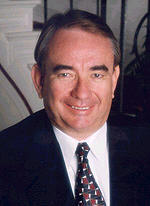 |

|
|
|
| Kaiser Daily HIV/AIDS Report
CDC Drops 'Known Epidemics' Such as HIV/AIDS from Model Legislation for Dealing With Public Health Emergencies
 After protests from HIV/AIDS advocates and civil libertarians, the CDC has dropped "known epidemics" such as HIV/AIDS from the list of possible emergencies in a revised version of model legislation that would give governors the power to order medical examinations and quarantines during times of declared public health emergency, the Wall Street Journal reports.
After protests from HIV/AIDS advocates and civil libertarians, the CDC has dropped "known epidemics" such as HIV/AIDS from the list of possible emergencies in a revised version of model legislation that would give governors the power to order medical examinations and quarantines during times of declared public health emergency, the Wall Street Journal reports.
Lawrence Gostin, director of the Center for Law and the Public's Health at Georgetown University, and colleagues drew up the first draft of the Model State Emergency Health Powers Act in October at the request of CDC officials who were concerned that states did not have comprehensive plans for "cop[ing] with a serious bioterrorism attack." The legislation is intended to be debated and adopted by individual state legislatures. The first draft -- which gave governors the power to declare a public health emergency when there was an "imminent" biological threat that could kill or seriously disable people and to order quarantines, commandeer hospitals, control medical and food supplies and isolate those who did not comply with medical examinations or treatment orders -- was "quickly endorsed" by HHS Secretary Tommy Thompson, and several states began taking steps to enact their own versions. However, that draft was problematic for AIDS activists who were concerned that a clause including "epidemic diseases" in the definition of a public health emergency would allow officials to isolate people with HIV infection (Lueck, Wall Street Journal, 1/7). San Francisco activists Michael Petrelis and David Pasquarelli on December 5 took out a full-page ad in the San Francisco Examiner to bring attention to the model legislation -- a version of which is expected to be introduced this month in the California Legislature by Assembly member Keith Richman (D). They claimed the bill would "give health officials sweeping powers to cage citizens suspected of harboring disease, confiscate and destroy their property, monitor patients and publicize their health histories and legally force medical testing and treatment without a court order" (Kaiser Daily HIV/AIDS Report, 12/6/01). However, the model law was revised last month to "narro[w] the definition of a public health emergency so it doesn't apply to known epidemics such as AIDS," the Journal reports. The new version also drops misdemeanor penalties for those who refuse medical treatment and allows people to opt out of treatment for "religious or other reasons." However, people may still be subject to isolation if they refuse to comply. Up to a dozen states, including California, Massachusetts and Minnesota, are expected to consider legislation based on the model law this year (Wall Street Journal, 1/7). FoxNews.com Explores Lawmakers' Questioning of CDC HIV Prevention Funding FoxNews.com examined the current debate over the use of CDC HIV prevention funding for workshops that have been deemed "obscene" by an HHS report and several legislators. An October report from the HHS inspector general found that workshops sponsored by the San Francisco-based Stop AIDS Project, a group that targets gay and bisexual men, bore names such as "Booty Call" and "Great Sex Workshop" and explored the use of masturbation and sex toys. The report said that such workshops, which were funded in part by a $698,000 CDC grant, were "obscene" and "could be viewed as encouraging directly ... sexual activity" (Vlahos, FoxNews.com, 1/7). Federal law prohibits organizations that receive money from the CDC for HIV prevention efforts from promoting sexual activity or drug use. Prevention efforts must meet obscenity standards set forth in the 1973 Supreme Court case Miller v. California. The report led to calls in Congress for further investigation, and a provision in the fiscal year 2002 Labor-HHS appropriations bill provides for an audit of all CDC-funded HIV prevention activities (Kaiser Daily HIV/AIDS Report, 12/20/01). Prevention 'By The Book' "Some of these groups have blatantly misused federal funds. They (CDC) are just throwing money out there without monitoring how these groups are spending it. This is not something that should be taken lightly," Roland Foster, an aide for the House subcommittee on Government Affairs, said. However, Stop AIDS and its supporters, including House Minority Whip Nancy Pelosi (D-Calif.), said that the organization has complied with CDC guidelines. "We did everything by the book, we did everything by the rules and we'll continue to do that," Stop AIDS Project Executive Director Darlene Weide said, adding that local health boards reviewed the programs. She also noted that the programs were designed for a "limited, targeted audience -- not the general public" (FoxNews.com, 1/7).
She noted that CDC officials who attended three of the group's workshops were not upset with them and pointed out that Miller v. California says obscenity standards are "to be determined by local community standards" and not blanket guidelines. She added that the HHS inspector general's report could "undermine the work of an effective organization, and inadvertently contribute to the burden of disease and death among gay and bisexual men" (Pelosi letter, 12/13/01). A 'Challenging' Message However, several of Pelosi's colleagues in Congress, including Reps. Mark Souder (R-Ind.) and Dave Weldon (R-Fla.), disagreed, saying that although their views may be "politically incorrect," there is a need to discuss how CDC money is being spent, particularly because HIV cases continue to rise. Weldon said he supports prevention efforts, but "[j]ust because you're gay doesn't mean you can spend the money any way you want to, especially if it's inappropriately. Somebody needs to be scrutinizing this more closely." Charles Henry, director of the Los Angeles County Office of AIDS Programs and Policy, cautioned that "limiting" HIV prevention materials to "what Washington deems effective" may not work in the gay community. "I think the debate is a fair one and important to reinvigorating prevention. But prevention messages (are) challenging, we have to constantly reinvent them -- it's hard to get people to change their behavior" (FoxNews.com, 1/7). This summary is from the Kaiser Daily HIV/AIDS Report http://www.kaisernetwork.org/dailyreports/hiv) provided by kaisernetwork.org), a free health policy news summary and webcasting service of The Henry J. Kaiser Family Foundation. The Kaiser Daily Health Policy Report is published for kaisernetwork.org by National Journal Group Inc. © 2001 by National Journal Group Inc. and Kaiser Family Foundation. All rights reserved. |

© 1997-2002 BEI
 Secretary of Health and Human Services Tommy Thompson
Secretary of Health and Human Services Tommy Thompson